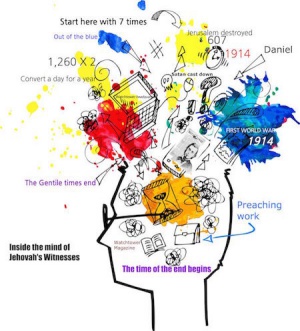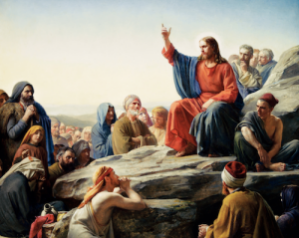If the WT has been in such egregious error before Jehovah purporting a supposed lie of 1914, and willfully doing so….how do we explain Jesus backing and blessing the preaching work of the last 100 years? Honestly, I’ve never understood how we apply Matthew 24:14 over the last 100 yrs. It makes more sense to apply it to a very impactful, swift and compact hard hitting ministry work, say 3.5 yrs. But, if as you state, the WT has offended Jesus and God over the 1914 debacle, what do you call this last 100 years of JW history? Was it blessed or not? What was its purpose, etc., if the WT is to be damned in a way?
Jehovah’s Witnesses tend to see things in black and white, obviously due in no small measure to their indoctrination by the Watchtower. While there is nothing objectionable about being indoctrinated with the truth, the problem is that the instrumentality that has been used to publish the truth has become an idol.
Mind you, an idol does not have to be tangible object. It can be anything that takes the place of Jehovah or that diminishes his place in the minds and hearts of his devotees. In this instance it is an institution that pretends to have unlocked all of the sacred mysteries of the Bible.
God put up with various forms of idolatry among the Israelites for centuries. Some of the kings successfully initiated reforms that got rid of the worst forms of idolatry, for which they were commended by God, but even at that, as in the instance of righteous King Josiah, he let the high places remain.
Nevertheless, Jehovah did not immediately abandon his people. Ultimately, he completely accomplished his purpose in connection with them, which was primarily to produce the Messiah.
Let’s face it: Jehovah’s Witnesses are not allowed to think outside the box, as the expression goes. In this case, the “box” is whatever the Watchtower teaches as the truth. And it is just as well, because those who stray outside the “box” often go back to the nonsensical teachings of the churches or become atheists or whatever. A few go completely off the proverbial reservation and start their own religion and try to recruit followers. Others might try to straighten out what is crooked. And that doesn’t work either. From Jehovah’s standpoint that is “like those who are contending against a priest.”
It is God’s prerogative to let error run its course and it is his prerogative to straighten things out in his due time and in his own way. Or, as King Solomon asked: “Consider the work of the true God, for who can straighten out what he has made crooked?” – Ec. 7:13
Because of the dominance of the Watchtower upon the spiritual lives of Jehovah’s Witnesses it is virtually impossible for them to imagine the future unfolding in any way other than what the Watchtower has impressed upon them. But as in the case of the Israelites Jehovah put up with their blindness and idolatry until he accomplished his purpose. We may be certain that his dealings in the past provide a pattern for modern times.
The prophecy of Isaiah foretells the blindness of God’s anointed ones. But it suits God’s purpose to allow it for the time being. Ultimately, Jehovah’s Witnesses have been blinded in respect to the coming of Christ. In their imagining that he is already come in 1914 and that virtually all prophecy has been fulfilled already, they have no expectation of the things to come —contrary to what the Watchtower proclaims.
In this, the organization-wide blindness sets the stage for a revelation – the unveiling.
Jehovah goes on to explain at Isaiah 48, speaking to those “who swear by the name of Jehovah,” God speaks to a point in the future from even this present moment, saying:
The former things I told you long ago. From my own mouth they went out, and I made them known. Suddenly I took action, and they came about. Because I knew how stubborn you are —That your neck is an iron sinew and your forehead is copper. I told you long ago. Before it came about, I caused you to hear it, so that you could not say, ‘My idol did this; my carved image and my metal image commanded this.’ You have heard and seen all of this. Will you not declare it? From now on I am announcing new things to you, guarded secrets that you have not known. Only now are they being created, and not long ago, things that you never heard before today, so that you cannot say, ‘Look! I already know them.’
What God is saying to his people is that the truth was there all along, but God has locked it up in what he calls “guarded secrets.”
The prophecy really pertains to the coming of Christ and that is evident in the context itself. Notice the 10th verse, which states: “Look! I have refined you, but not in the form of silver. I have tested you in the smelting furnace of affliction.
This is similar to what we read in the third chapter of Malachi that refers to the coming of the messenger of the covenant with the fire of a refiner.
The point in time referred to in Isaiah as “now” is when God opens the eyes of the blind after they emerge from the fiery crucible of affliction. At that point no one will be able to say they had already known of these things. Thus, the Watchtower idol will be thoroughly discredited and Jehovah will be placed on high.
The question that God will then pose to his humbled remnant —“Will you not declare it?” — intimates that there will be a post-Watchtower preaching work. That is not to say that the present preaching work is not also part of God’s work. Obviously it is. But, it is not the end of it. There is a concluding phase to come.
What form will it take? How will it be accomplished? How many from among Jehovah’s Witnesses now will participate in it? We don’t know. It’s a closely guarded secret.



